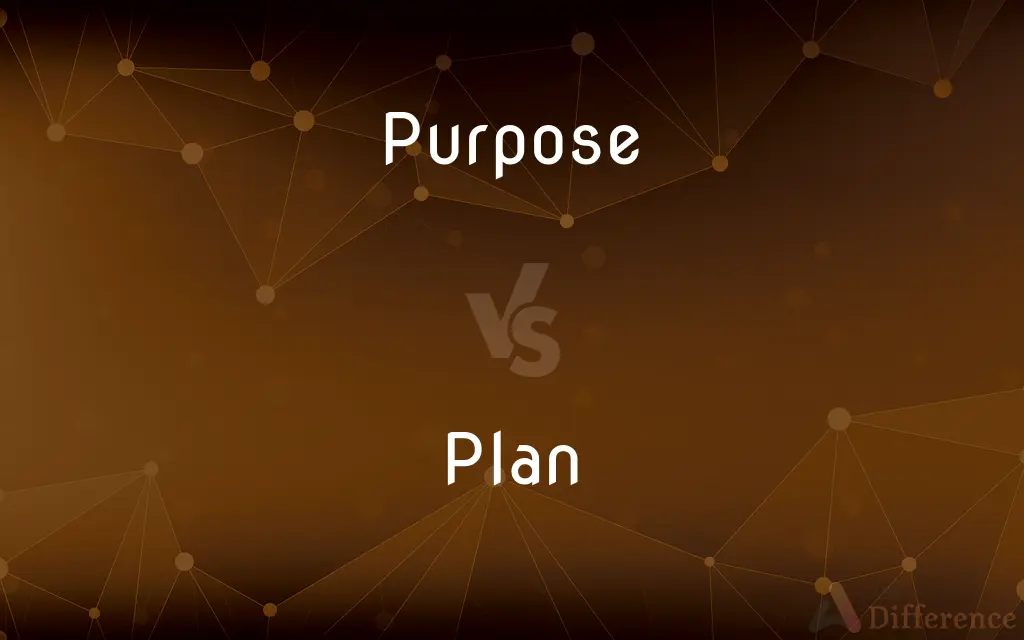Purpose vs. Plan — What's the Difference?
By Tayyaba Rehman & Fiza Rafique — Updated on March 17, 2024
Purpose is the reason something is done or created, the motivation behind actions; a plan is a detailed proposal for doing or achieving something, outlining steps or procedures.

Difference Between Purpose and Plan
Table of Contents
ADVERTISEMENT
Key Differences
Purpose serves as the fundamental reason or motivation behind an action, project, or existence of something. It answers the "why" question, providing a sense of direction and meaning. For instance, the purpose of an educational program might be to empower students with knowledge and skills for their future careers. Plans, on the other hand, are the concrete steps or strategies devised to achieve a specific goal or purpose. They address the "how" question, detailing the methodology or process to be followed. Using the previous example, a plan for an educational program would include the curriculum, teaching methods, and assessment strategies to fulfill its purpose.
While purpose provides the vision and underlying reason for endeavors, plans are practical roadmaps designed to realize that vision. Purpose is abstract and often broad, inspiring action and guiding decision-making. Plans are tangible, specific, and action-oriented, often including timelines, resources needed, and milestones. For example, a company's purpose might be to innovate in technology to improve people's lives, whereas its plan could involve specific product development cycles, market research, and launch strategies to bring new technologies to consumers.
Understanding the distinction between purpose and plan is crucial in both personal and professional contexts. Purpose motivates individuals and organizations, giving clarity to their goals and aspirations. Plans, equipped with this clarity, enable the systematic pursuit of these goals. They require adaptability and regular review to ensure alignment with the original purpose, especially as circumstances change. A plan without a clear purpose may result in aimless or inefficient actions, while a purpose without a plan lacks the structure needed for realization.
The relationship between purpose and plan is symbiotic. Purpose inspires and directs plans, while the execution of plans substantiates and advances the purpose. This dynamic interaction ensures that efforts are meaningful and coordinated towards achieving desired outcomes. In any endeavor, identifying the purpose first lays the groundwork for developing effective plans, thereby enhancing the likelihood of success and fulfillment.
Comparison Chart
Definition
The reason or motivation behind actions.
A detailed proposal for achieving something.
ADVERTISEMENT
Focus
"Why" - the motivation and goal.
"How" - the steps and methodology.
Nature
Abstract and broad.
Tangible and specific.
Role
Provides direction and meaning.
Outlines the strategy and actions needed.
Application
Vision and inspiration for endeavors.
Execution and operationalization of ideas.
Compare with Definitions
Purpose
The fundamental reason for something's existence.
The purpose of the fundraiser was to support local charities.
Plan
A detailed formulation of a program of action.
The city's urban development plan addresses both housing and transportation.
Purpose
The driving force behind personal or collective endeavors.
Their company's purpose was to make education accessible to all.
Plan
An arrangement or scheme for doing something.
Their business plan was reviewed by potential investors.
Purpose
What something is used for.
The purpose of the tool is to simplify complex calculations.
Plan
A set of intended actions, usually detailed and organized.
The event coordinator shared the plan for the day's activities.
Purpose
A motivating goal behind actions or decisions.
Her purpose in studying abroad was to gain a global perspective.
Plan
A method or strategy devised to accomplish an objective.
His plan for weight loss included diet changes and regular exercise.
Purpose
An intended or desired outcome.
The purpose of the new law was to reduce traffic accidents.
Plan
A plan is typically any diagram or list of steps with details of timing and resources, used to achieve an objective to do something. It is commonly understood as a temporal set of intended actions through which one expects to achieve a goal.
Purpose
The object toward which one strives or for which something exists; an aim or goal
Her purpose in coming here is to talk to you. The purpose of an airliner is to transport people.
Plan
An orderly or step-by-step conception or proposal for accomplishing an objective
A plan for improving math instruction.
Purpose
Determination; resolution
He was a man of purpose.
Plan
A proposed or intended course of action
Had no plans for the evening.
Purpose
To intend or resolve
"the gap between what is said and what is purposed" (Ian Donaldson).
Plan
A systematic arrangement of elements or important parts; a configuration or outline
A seating plan.
The plan of a story.
Purpose
The end for which something is done, is made or exists.
What is the purpose of your visit?
My purpose in coming to Egypt was simply to take it en route to the desert.
It has been my purpose to illustrate rather than to explain.
The exceptionally small gate-leg table served the purpose of a tea table admirably.
The purpose of the device is to prevent the breechblock from opening accidentally should the gun be held barrel down.
The purpose of this letter is to set the record straight.
The purpose of this book is to study the interrelationship of government and religion.
The device can be used for both civilian and military purposes.
The purpose of turning off the lights overnight is to save energy.
Plan
A drawing or diagram made to scale showing the structure or arrangement of something.
Purpose
Function, role.
Plan
In perspective rendering, one of several imaginary planes perpendicular to the line of vision between the viewer and the object being depicted.
Purpose
(Sense of having a) meaning for existing or doing something.
Plan
A program or policy stipulating a service or benefit
A pension plan.
Purpose
Resolution; determination.
Plan
To formulate a scheme or program for the accomplishment, enactment, or attainment of
Plan a campaign.
Purpose
(obsolete) The subject of discourse; the point at issue.
Plan
To have as a specific aim or purpose; intend
They plan to buy a house.
Purpose
(transitive) To have or set as one's purpose or aim; resolve to accomplish; intend; plan.
Plan
To draw or make a graphic representation of.
Purpose
(intransitive) To have (an) intention, purpose, or design; to intend; to mean.
Plan
To make plans.
Purpose
To discourse.
Plan
A drawing showing technical details of a building, machine, etc., with unwanted details omitted, and often using symbols rather than detailed drawing to represent doors, valves, etc.
The plans for many important buildings were once publicly available.
Purpose
That which a person sets before himself as an object to be reached or accomplished; the end or aim to which the view is directed in any plan, measure, or exertion; view; aim; design; intention; plan.
He will his firste purpos modify.
As my eternal purpose hath decreed.
The flighty purpose never is o'ertookUnless the deed go with it.
Plan
A set of intended actions, usually mutually related, through which one expects to achieve a goal.
He didn't really have a plan; he had a goal and a habit of control.
Purpose
Proposal to another; discourse.
Plan
A two-dimensional drawing of a building as seen from above with obscuring or irrelevant details such as roof removed, or of a floor of a building, revealing the internal layout; as distinct from the elevation.
Seen in plan, the building had numerous passageways not apparent to visitors.
Purpose
Instance; example.
Plan
A method; a way of procedure; a custom.
Purpose
To set forth; to bring forward.
Plan
A subscription to a service.
A phone plan
An Internet plan
Purpose
To propose, as an aim, to one's self; to determine upon, as some end or object to be accomplished; to intend; to design; to resolve; - often followed by an infinitive or dependent clause.
Did nothing purpose against the state.
I purpose to write the history of England from the accession of King James the Second down to a time which is within the memory of men still living.
Plan
(transitive) To design (a building, machine, etc.).
The architect planned the building for the client.
Purpose
To have a purpose or intention; to discourse.
Plan
(transitive) To create a plan for.
They jointly planned the project in phases, with good detail for the first month.
Purpose
An anticipated outcome that is intended or that guides your planned actions;
His intent was to provide a new translation
Good intentions are not enough
It was created with the conscious aim of answering immediate needs
He made no secret of his designs
Plan
(intransitive) To intend.
He planned to go, but work intervened.
Purpose
What something is used for;
The function of an auger is to bore holes
Ballet is beautiful but what use is it?
Plan
(intransitive) To make a plan.
They planned for the worst, bringing lots of emergency supplies.
Purpose
The quality of being determined to do or achieve something;
His determination showed in his every movement
He is a man of purpose
Plan
A draught or form; properly, a representation drawn on a plane, as a map or a chart; especially, a top view, as of a machine, or the representation or delineation of a horizontal section of anything, as of a building; a graphic representation; a diagram.
Purpose
Propose or intend;
I aim to arrive at noon
Plan
A scheme devised; a method of action or procedure expressed or described in language; a project; as, the plan of a constitution; the plan of an expedition.
God's plans like lines pure and white unfold.
Purpose
Reach a decision;
He resolved never to drink again
Plan
A method; a way of procedure; a custom.
The simple plan,That they should take who have the power,And they should keep who can.
Plan
To form a delineation of; to draught; to represent, as by a diagram.
Plan
To scheme; to devise; to contrive; to form in design; as, to plan the conquest of a country.
Even in penance, planning sins anew.
Plan
A series of steps to be carried out or goals to be accomplished;
They drew up a six-step plan
They discussed plans for a new bond issue
Plan
An arrangement scheme;
The awkward design of the keyboard made operation difficult
It was an excellent design for living
A plan for seating guests
Plan
Scale drawing of a structure;
The plans for City Hall were on file
Plan
Have the will and intention to carry out some action;
He plans to be in graduate school next year
The rebels had planned turmoil and confusion
Plan
Make plans for something;
He is planning a trip with his family
Plan
Make or work out a plan for; devise;
They contrived to murder their boss
Design a new sales strategy
Plan an attack
Plan
Make a design of; plan out in systematic, often graphic form;
Design a better mousetrap
Plan the new wing of the museum
Common Curiosities
Can a plan change while the purpose remains the same?
Yes, plans can and often do change in response to new information or circumstances, while the underlying purpose remains constant.
Why is purpose important?
Purpose is important because it gives meaning, direction, and motivation for actions, guiding decision-making and efforts towards meaningful goals.
How do purpose and plan relate to each other?
Purpose and plan are interrelated; purpose provides the reason and motivation for actions, while a plan is the structured approach to achieving the purpose.
What are the key components of a good plan?
A good plan includes clear objectives, detailed steps, resources required, timelines, and mechanisms for monitoring and adjusting as needed.
Can a person have more than one purpose?
Yes, individuals can have multiple purposes, reflecting different aspects of their lives, such as career, personal growth, and relationships.
Is it possible to have a plan without a purpose?
While technically possible, a plan without a clear purpose may lack direction and effectiveness, leading to aimless or unfulfilled efforts.
How should one adjust their plan if it’s not fulfilling the purpose?
If a plan is not fulfilling the purpose, it should be re-evaluated and adjusted based on feedback and changing circumstances to better align with the intended goals.
What role does flexibility play in planning?
Flexibility is crucial in planning, allowing for adjustments and adaptations in response to unforeseen challenges or opportunities.
How does one identify their purpose?
Identifying purpose involves introspection, considering passions, values, and the impact one wishes to make in their life or the world.
Can an organization have multiple plans for a single purpose?
Yes, an organization can devise multiple plans targeting different aspects or strategies to achieve a single overarching purpose.
How can understanding your purpose influence your daily life?
Understanding your purpose can provide clarity, influence priorities, and inspire actions that align with your goals and values, leading to greater fulfillment and impact.
What happens when there is a misalignment between purpose and plan?
Misalignment can lead to inefficiency, frustration, and failure to achieve desired outcomes, emphasizing the need for regular alignment checks.
Can a purpose evolve over time?
Yes, as individuals or organizations grow and change, their purposes can evolve to reflect new insights, goals, and challenges.
Why is it important to communicate your plan effectively?
Effective communication ensures that everyone involved understands the objectives, roles, and expectations, leading to better coordination and execution.
How does culture influence an organization’s purpose and plan?
Culture influences the values, behaviors, and priorities that shape an organization’s purpose and the strategies outlined in its plan.
Share Your Discovery

Previous Comparison
Fisher vs. Fisherman
Next Comparison
Task vs. ChoreAuthor Spotlight
Written by
Tayyaba RehmanTayyaba Rehman is a distinguished writer, currently serving as a primary contributor to askdifference.com. As a researcher in semantics and etymology, Tayyaba's passion for the complexity of languages and their distinctions has found a perfect home on the platform. Tayyaba delves into the intricacies of language, distinguishing between commonly confused words and phrases, thereby providing clarity for readers worldwide.
Co-written by
Fiza RafiqueFiza Rafique is a skilled content writer at AskDifference.com, where she meticulously refines and enhances written pieces. Drawing from her vast editorial expertise, Fiza ensures clarity, accuracy, and precision in every article. Passionate about language, she continually seeks to elevate the quality of content for readers worldwide.














































